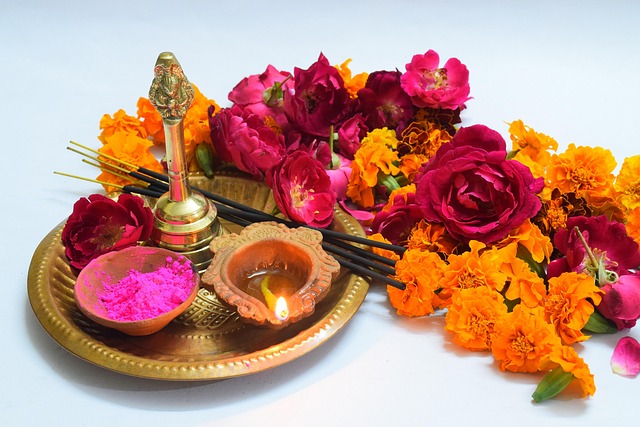Lighting a lamp in the morning and having a daily meditation session or reciting prayers and rituals have been a part of the human experience through the ages and cultures. Although rituals can be seen as traditions or some spiritual activity by many, contemporary psychology indicates that they have a far more profound role in the development of our mental and emotional state. Actually, rituals, be they sacred or cultural or personal, have far-reaching psychological benefits that are usually unobserved.
We will discuss rituals as a way of sacredness and their concealed psychological advantages in this blog and how these rituals have the power to give us a sense of stability, calmness, and meaning in our everyday life.
What Are Sacred Rituals?
Sacred rituals are symbolic acts that are done with intention and mindfulness. They do not refer only to religion but may also encompass daily habits, cultural rites, or individual spiritual practices. Examples include:
- Lighting an incense or a diya before praying.
- Weekly attendance at religious meetings.
- Meditating or chanting mantras.
- Religious holidays such as Diwali puja or Christmas Mass.
- Basic everyday rituals such as giving gratitude for meals.
A ritual is not only sacred because it is done in a certain way but also because of the meaning and purpose of the ritual.
What is the relevance of rituals in a contemporary life?
Nowadays, life in our fast digital world is unpredictable and overwhelming. Sacred rituals give us a feeling of rhythm and order as they remind us to stop, resume, and reflect. They provide us an anchor when stressful situations happen, making us feel down and in control.
According to psychologists, rituals act as a coping strategy—they allow us to work out our emotions, deal with uncertainty, and form a sense of belongingness. That is why even such little rituals as a cup of tea in the morning taken silently may seem to be sacred and relaxing.
Secret Psychological Profits of Sacred Rituals
1. Reduce Anxiety and Stress
Rituality brings about predictability. When we light a candle, chant, or watch a patterned series of steps, the brain takes it as structure, which inherently reduces stress levels. Rituals have been found to help lower anxiety by providing the mind with something that it knows and an activity that it has become used to.
2. Increase cognitive abilities and alertness
Religious ceremonies must be listened to. To illustrate, mantra chanting or yoga ritual practice cannot be fully done without total concentration. The practice does not only enhance concentration, but it also helps to silence the mind chatter, which facilitates clarity and tranquility.
3. Create a Sense of Belonging
Connection is brought about in group rituals such as family prayers, cultural festivals, or community rituals. They provide us with a feeling of identity and belonging, and we feel a part of something bigger than we are. This plays a crucial role in mental health, particularly in the modern world, where people are used to isolation.
4. Help in Emotional Healing
Grief rituals such as lighting candles in memory of people we love or maintaining silence can help us to grieve. According to the psychologists, such symbolic behaviors assist the brain to move in and out of emotions and give closure, which is the key to healing.
5. Increase Self-confidence and Self-control
Pre-event rituals such as athletes going through pre-game rituals and students praying before tests enhance confidence. They make people feel that they have control even when situations are uncertain and hence less fear and doubt.
6. Promote Generosity and Optimism
Numerous religious practices, like saying prayers before eating or saying prayers daily, develop a positive attitude. Gratitude practices condition the brain to look at abundancy and not scarcity, which makes them happier and more resilient.
Rituals Across Cultures: a Universal Language
Interestingly, it is all cultures and traditions of the world in which rituals are present:
Hinduism: Diya lamps, mantras, and puja every day.
Christianity: Going to church, prayer, pre-meal prayer.
Buddhism: Practices of minds, mindfulness, and meditation.
Islam: 5 times praying (Namaz), Ramadan fasting, charity.
Cultures of the natives: dance, narration, and ceremonies of nature.
Although these rituals vary greatly, they all have one goal: to unite a person with a higher power, community, or even their inner selves, which also offers psychological relief.
Basic Religious Meditations You can Do Daily
There is no need to get fancy ceremonies to benefit from rituals. Here are a few simple ones:
- Write down a list at the beginning of the day and list the things you are thankful for.
- Pre-meditation Light a candle or incense.
- Make a conscious walk without saying a word.
- Take affirmations or mantras on a daily basis.
- Decode your day by spending some minutes in contemplation or journaling.
- These are tiny steps that will enable you to feel relaxed and upbeat.
Conclusion
Sacred rituals are not exactly a symbolic exercise of tradition but strong psychological instruments that provide a degree of stability, calm, and meaning to life. Rituals allow us to relieve anxiety, enhance mindfulness, emotionally recover, and feel connected, whether they are a community celebration, a religious experience, or a personal routine.
By adopting religious practices in your everyday life, you do not just pay tribute to tradition; you also feed your mind and soul. These rituals provide the secret key of serenity and sanity in a world that frequently seems to be chaotic.
And the next time you put on a lamp, lay your head and pray, or even take a meditation breath, keep in mind—you are not going through the motions; you are healing your psyche.
